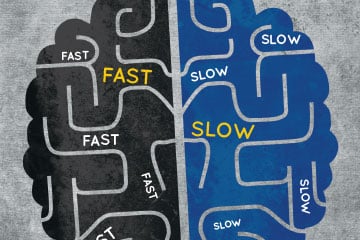Behavioural economics has some important lessons that lawyers can put to practical use.

Behavioural economics has some important lessons that lawyers can put to practical use.
Imagine you outline to your client the possibilities of two court actions where he is the plaintiff in one case and the defendant in another. Legal fees are no longer a cost consideration. In the first case, you advise that he could settle and receive $70,000 or have a 90-per-cent chance of the court awarding him $80,000. In the second case, you advise that he could settle and pay $70,000 or have a 90-per-cent chance of the court deciding he should pay $80,000. If he was like most people, in the first case, he would settle for the $70,000. In the second case, he would likely go to court and risk paying $80,000. People prefer sure things when it comes to gains and take risks when it comes to avoiding losses. Lawyers explaining the consequences of a certain legal action should be prepared that a client may be prone to more risk taking to avoid a loss.
This simple example captures an important lesson from behavioural economics, popularized in the books Thinking: Fast and Slow by Daniel Kahneman and Nudge: Improving Decisions About Health, Wealth, and Happiness by Richard Thaler. Kahneman and Thaler separately won the Nobel Prize for work in their respective fields. The Obama administration successfully incorporated the concept of “nudges” into their policy work. Their theories can help lawyers in the practice of law and in the attraction and retention of clients.
Kahneman separates our thought process into a simple dichotomy of fast, or “system 1,” thinking, and slow, or “system 2,” thinking.
System 1 thinking explains why people feel losses twice as much as they feel comparable gains. Fast thinking comes into play when you stand up to object to a line of questioning without knowing why, when you sense a brief misses something or when you believe that there really is a tiger outlined in the grass just ahead. Regardless of your personal circumstances, fast thinking comes in handy to avoid being eaten — figuratively or literally.
Fast thinking includes intuition. Although thinking with your gut can be dismissed as superficial, Kahneman recognizes that experts glancing at a situation can reach a correct conclusion simply based on continuous experience.
Intuitive thinking guides the halo effect. Someone’s reputation and ego could precede them or exceed them. This may give this person an aura of invincibility in that they have won so often they will likely win again. If you or a court provide that person the benefit of the doubt, a halo, so to speak, then you should dissuade yourself of this notion. Rest assured, the rest of the day has not yet been written. Anything can and will likely happen.
Information immediately available primes system 1 thinking and feeds into the “anchoring” concept. Kahneman provides the example of a panel of German judges asked to roll a weighted die that came up with three or nine. The judges were then asked to provide a ruling on a certain fact situation. Although it should not have mattered, judges rolling a nine more often gave higher sentences than the judges who rolled a three.
System 2, or slow thinking, represents the traditional lawyer mind: collecting facts, analyzing those facts and providing a researched opinion. Relative to fast thinking, slow thinking generally has to be dragged into the thought process if the mind feels that fast thinking “has got this covered.” Slow thinking eats Doritos while watching TV. I prefer the term “critical thinking” as slow thinking suggests something negative.
Understanding how prospective clients think can impact how you market your law firm. Imagine yourself a prospective client landing on your firm’s website. The website asks if you want to allow cookies in order to enhance your website experience. Being like most people, you are somewhat aware that cookies attach to your browser benignly. But you read something about them somewhere and your overall impression leans toward not allowing cookies. You congratulate yourself on being prudent, but your web experience becomes muted. The law firm suffers an opportunity cost.
Continuing your search, you land on another site that clearly, but not alarmingly, states that a small piece of code — a cookie — shall be added to your web browser. Once again, you don’t know anything more about cookies than you did five minutes ago, but you proceed regardless. Your web experience becomes far more customized, and the law firm discovers substantial information on future clients’ interests.
Most clients intuitively refuse to accept cookies given the choice. The critical part of the mind would not examine the situation since there did not appear to be an immediate need. A client merely advised of cookie use would likely proceed, confident in the notion that someone vetted the cookie usage for them. The concept of providing a default cookie option nudges the client into a better result.
One would think that providing a range of options provides greater satisfaction than fewer options. However, Thaler says that having too many options leads to greater stress and reduced satisfaction. Therefore, providing a default option increases the probability that a correct choice is being made.
Thaler euphemistically refers to this as libertarian paternalism. People make better decisions by the correct arrangement of choices. The person in charge of this arrangement becomes the choice architect.
A lawyer becomes a choice architect in numerous ways. In speaking with a client and laying out their options, the phrasing of options impacts the client’s choice. Many lawyers tend to say “on one hand this and the on other that,” because they want to leave the choice of options strictly to the client. However, in reality, one should determine what level of guidance the client requires. Normally, they would want the lawyer’s best recommendation.
Thaler parses the various tools that a choice architect has into five main aspects: incentives, mapping, defaults, feedback, expect errors and structuring complex choices. For example, data visualization of legal information can illustrate the difference between complex choices. In retaining clients, understanding the process behind making decisions increases your value proposition or your benefits relative to the costs. By making the correct choice easier, you have channeled your client to the correct choice. You have reduced not so much the monetary cost to the client but the stress cost of making that decision.
In making an intuitive choice, clients want to know what other people did in similar situations. Thaler found that a need to conform easily influences peoples’ choices. Clients could operate on this basis to decide how to proceed on a case. They would rely more on what friends and other people have done in a similar situation. This points to the importance of stories. Relating other individual’s stories can add additional comfort to clients and make the decision easier. Adding stories to your advice makes a client’s choice easier.
To demonstrate this, Thaler identifies greater compliance in hotels where people are advised that previous guests picked the economical option of not having their towels replaced daily. People like to be part of the crowd, as this makes their decisions easier. Your law firm stories should reflect how generally others have proceeded. These concepts should be incorporated into continuing professional development for all lawyers.
As a final example, do you think it is more likely that the number of lawyers in Canada is between 60,000 and 70,000 or between 70,000 and 80,000? As you can see, I have provided some anchoring information here and in the very first paragraph. The federation of law societies lists 117,000 lawyers practising today.
When people rely upon their intuition, they can be swayed by other factors. These innovative concepts require greater examination and incorporation into today’s law practice, particularly in cases where they might operate to your client’s detriment. Did you feel the nudge?
Gary Goodwin is in-house counsel for a conservation organization, and since he would like to keep it that way, all expressed opinions are strictly his own.











